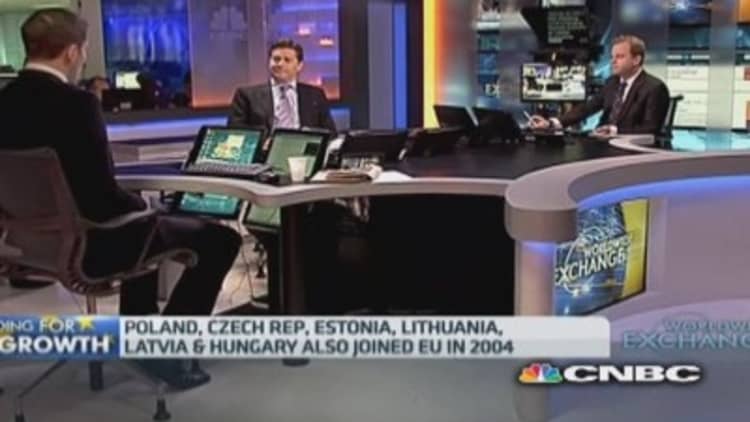
It is ten years to the day since the largest single expansion of the European Union (EU), when ten countries joined the bloc to much fanfare across the region.
The historic event of May 1, 2004, saw Cyprus, the Czech Republic, Estonia, Hungary, Latvia, Lithuania, Malta, Poland, Slovakia and Slovenia become members of the EU. Since that date only three further countries – Bulgaria, Croatia and Romania - have joined the economic and political union.
But the past decade has been a bumpy one for the EU, particularly for those member states which are also part of the euro zone.
So has the EU's rapid expansion over the past ten years – it now boasts a total of 28 member states - been a cause for celebration or reflection?
Read MoreEuro zone inflation rises, pressure remains on ECB
Neil Shearing, chief emerging markets economist at Capital Economics, said the accession of eastern European countries in particular had worked well.
"The expansion into the east of Europe is perhaps one of the rare success stories that the EU can point to over the past decade or so," he told CNBC.
"It's been the anchor for strong and sustainable growth in eastern Europe, it's been the anchor for rising prosperity in places like Poland, the Czech Republic and Slovakia."
'Doesn't belong'
But Shearing stressed there was a key distinction to be made between those countries that just became members of the EU, and those that also joined the euro zone.
Of the ten counties to join the EU in 2004, six - Cyprus, Estonia, Latvia, Malta, Slovakia and Slovenia – have since joined the single currency.
Read MoreHow real is the euro zone recovery?
"It's pretty clear that countries like Slovenia (and) Cyprus joined the single currency too soon," Shearing said, adding that the convergence criteria required to join the euro zone had not been fully met in these cases.
"These are still – certainly Slovenia – a relatively poor emerging market. (It's) very different in structure to places like Germany and France. It doesn't really belong in the single currency in my opinion," he added.
The euro zone – which has 18 member states - was hard hit by the global financial crash of 2008, which resulted in a sovereign debt crisis across the continent in 2011.
Cyprus became the fourth euro zone country to request an international bailout, and imposed a levy on bank deposits over 100,000 euros ($139,000) in exchange for a 10 billion euro aid package.
Most euro zone countries have since undergone a tough fiscal tightening programs, and have also been battling with a strong euro.
Over the past year, the euro has strengthened 5.4 percent against the dollar, making exports more expensive on the global market, thereby hindering the euro zone's efforts to grow and regain its competitiveness.
Despite this, Shearing added: "I think that countries that stayed out of the single currency but are part of the European Union, for those countries, the EU had been a runaway success."
Croatia lags
Piers Curran, head trader and managing director at Amplify Trading, however, said he was unconvinced that being a member of the EU was, in and of itself, a beneficial thing.
He highlighted the case of Croatia, the EU's newest member, which joined in July 2013. Its economy contracted for the fifth consecutive year in 2013.
"When Slovenia joined, the argument afterwards was perhaps the joined too quickly. The process of joining has been so elongated now - it took Croatia eight years of negotiations to actually be allowed to join the club," he said.
Read MoreUK government split over EU membership
"But since they've joined it has had no positive effect on their economy altogether, in fact it's probably had a negative effect."
Croatia is struggling to meet EU restrictions on budget deficit levels, and has been given three years to get its deficit on target. As a result, the government plans to cut spending, slash subsidies and boost revenue by raising some taxes.
Shearing agreed that Croatia had deep structural problems in its economy, which should have been dealt with as part of the accession to the EU. But he was adamant that there was plenty to gain by becoming a member of the EU.
"Membership of the single market is a huge positive… The institutional reforms which are needed to join the EU are important," he said.
"And of course, these are countries that are net beneficiaries in a fiscal sense. They are net beneficiaries from the EU budget."


